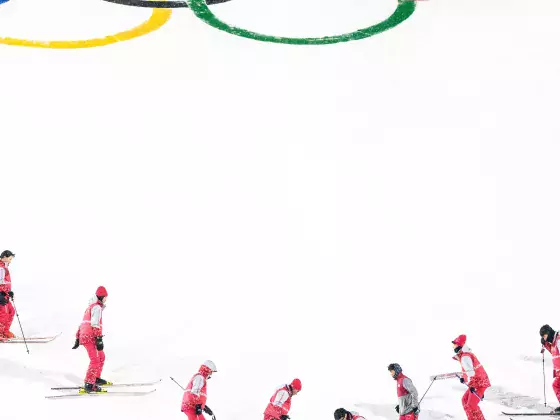Calgary and the 2026 Winter Olympic Games – Yes?
Paula Worthington
The 1988 Olympic Winter Games in Calgary created a legacy that would span decades and shape the spirit of the city. As a kid, I remember feeling the immense pride knowing that my hometown would be the final stop on the flame torch relay and be hosting the games.
We planned family outings to watch events, cheered on relay runners, and watched in amazement as our own McMahon Stadium was broadcast on screens around the world. My Mom volunteered her time to do calligraphy for the athletes’ medal certificates, feeling thrilled that her work would be proudly displayed in the homes of champions around the world. Looking back, being a young Calgarian as we hosted the world felt like an important rite of passage in my childhood.
Join Jim Bar (aka Doc Pow) Tuesday July 17 @Winsport Calgary for a discussion on Yes Calgary 2026
Now, 30 years later, our city has evolved: Calgary is at a crossroads and at the threshold of change – our economy is different; the world is different. Many grapple with how we move in a new direction with new possibilities, but at what cost? With many acknowledging that the oil industry will “never be the same,” it's important to focus our efforts on what we dare to gain, rather than what we have to lose.
When it comes to the 2026 Winter Olympic Bid, many are saying Yes, with a question mark.
Yes?
Calgary will hold a plebiscite later this year, where the public will have the opportunity to cast a vote on whether they support or oppose the city hosting the 2026 Winter Olympics. But before we get there, there’s a lot of questions (and question marks) that need to be addressed.
According to Emma May, an Ambassador with Yes Calgary 2026, a grassroots organization of volunteers who are passionate about bringing the Games back to Calgary in a responsible manner, her “Yes” comes with a question mark, too.
“It’s not “Yes” at any cost – we need to look at the opportunities and challenges in a way that’s truly Calgarian,” says May. “Costs include financial considerations, but also other costs: Resources, volunteerism, infrastructure and more.
“Some people are concerned about the IOC and its track record, they want to make sure that if we move forward, it’s an ethical bid that reflects our values.”
The Calgary sport legacy created from the 1988 Winter Olympics is celebrated across the country – many winter athletes come to train and live in Calgary for the opportunity to access world-class facilities and coaches. But many of those venues require an upgrade or complete rebuild to meet contemporary Olympic needs.
“The 1988 games really helped Calgary identify who we are as a city and a culture – the spirit of volunteerism was really cemented by those Olympics,” says May. “It could be a great way to continue to build that culture with the next generation.”
A Yes bid also gives rise to the growth of the Creative Class, a concept that excites Jim Barr, founder of SnowSeekers and an Ambassador for Yes Calgary 2026.
“Think about the next generation of journalists, content producers, artists, app makers, video producers. It’s the creative class that’s on the rise, and the Olympics could be the perfect spark to ignite this group and take Alberta into a whole new economic territory.”
So, beyond the actual cost of hosting the Games, Barr believes it could serve as a powerful platform to create new economic drivers.
“Yes, we have to look at the cash investment to make the Games happen, but can we also implement an innovative mindset to think about how something like the Olympics can become an economic driver for the creative class to rise? Can we be so bold to say that the Olympics could help move the Alberta economy from being resource-dependent to creative-dependent?”
When it comes down to dollars and cents, according to May, the most recent figure is $4.6 billion dollars.
“Everything is expensive, but we can be very strategic in terms of leveraging the infrastructure that we have in place,” says May. “We also want to be strategic when it comes to issues and the potential non-financial costs of sustainability and ethics. We want to ensure we represent ourselves well from every angle.”
What can’t be argued is how Calgarians are taking this decision to heart, which is part of the fabric of our community. Yes Calgary 2026 is focused on driving conversation between citizens and asking and answering the tough questions about the economics of the decision, our values and priorities.
If Calgary decides to step onto the podium for 2026, it should be with a confident leap, driven by a new kind of fuel – the confidence of a creative class and the energy of athletes, volunteers, and citizens who don’t just live here, but hold Calgary in their hearts.
Yes Calgary 2026 will be hosting an information event on Tuesday, July 17 to discuss the potential Calgary 2026 Olympic and Paralympic Winter Games Bid. The event will include messages from Ambassadors and Calgarians of all walks of life. The goal of the event is to provide facts about the bid and address the question marks.
Learn more about Calgary 2026 from Seekers writer Joanne Elves.
Like Our Facebook Page




